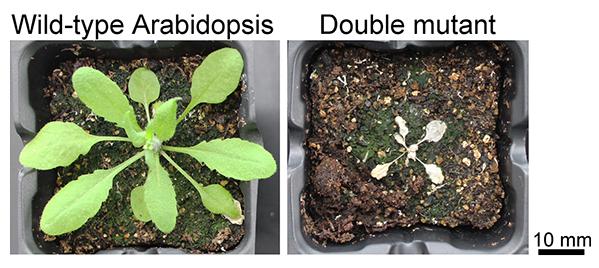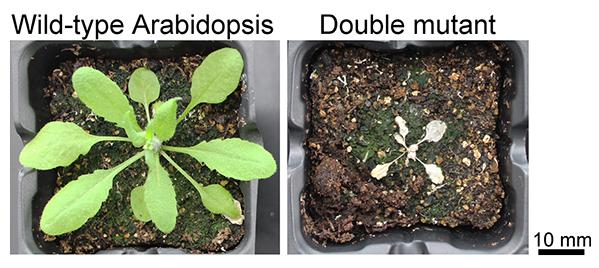
Credit: Masanori Izumi
Researchers at Tohoku University have found that plants activate autophagy in their leaf cells to derive amino acids that are used for survival under energy-starved "hunger" conditions. The findings show that amino acid utilization in plants can be controlled by the manipulation of autophagy.
Plants use solar energy for growth through a process known as photosynthesis. Photosynthesis reactions occur in chloroplasts, which are the intracellular compartments in green organs, mainly in leaves. In nature, plants cannot get enough solar energy when neighboring plants shade them from the sun. Under agricultural fields, insufficient sunshine due to unusual weather, or natural disasters such as flooding, strongly inhibits energy acquisition in crop plants. Therefore, many researchers are interested in how plants cope with their "hunger" due to the shortage of solar energy.
Drs. Masanori Izumi and Hiroyuki Ishida from Tohoku University had previously demonstrated that plant chloroplasts are actively digested via a process of autophagy during energy starvation. Autophagy is the "self-eating" process of consuming the portion of intracellular proteins in the cells of eukaryotes such as yeast, humans and plants. The research group focused on the precise role of chloroplast-targeted autophagy in the plant survival strategy under low-energy stress. "We hypothesized that chloroplast-associated autophagy is closely linked to the amino acid metabolism in energy-starved plants", said Izumi.
According to the study, when a cress plant known as Arabidopsis thaliana is exposed to hunger stress as plants are transferred into complete darkness they can continue to grow for several days; autophagic digestion of chloroplast proteins are rapidly activated and amino acid levels increase. This response during the early stage of hunger stress is suppressed in the mutant plants lacking autophagy machinery.
The group also found that the levels of branched chain amino acids (BCAAs: valine, leucine, isoleucine) especially increase in wild-type Arabidopsis; conversely, the increase in BCAAs are strongly compromised in the mutants of autophagy. "The mutants lacking enzymes required for the reuse of BCAAs as an energy source also showed the reduced tolerance to hunger stress – we expect that autophagy and BCAA reuse pathways cooperate in plants to overcome such stress," explained Izumi.
The amino acid recycling is important in crop productivity, as amino acids derived from protein breakdown are mobilized and stored in seeds in cereal crops before harvest. The current findings show the possibility that the manipulation of autophagy allows plants to modify their amino acid use. The researchers believe that further elucidation of regulation mechanisms of chloroplast autophagy could provide new avenues to improve the quality or productivity in cereal cultivation.
###
Media Contact
Masanori Izumi
[email protected]
@TohokuUniPR
http://www.tohoku.ac.jp/en/
Original Source
https://www.tohoku.ac.jp/en/press/plants_overcome_hunger.html http://dx.doi.org/10.1093/pcp/pcy005





